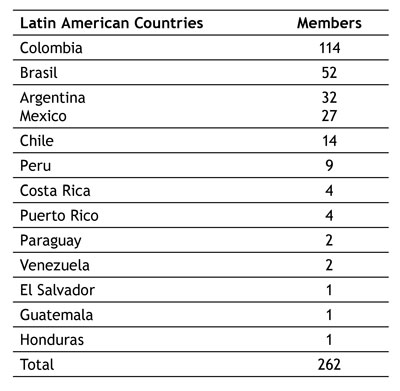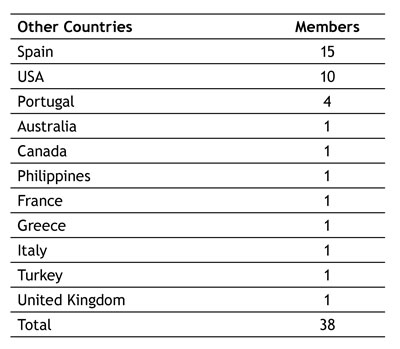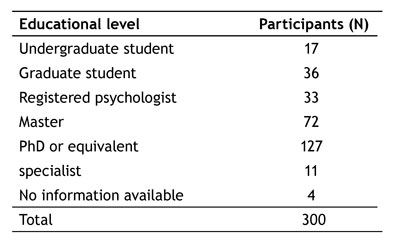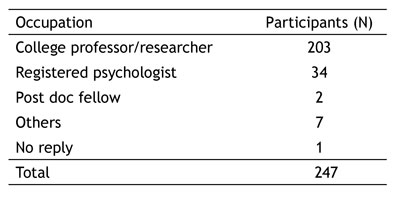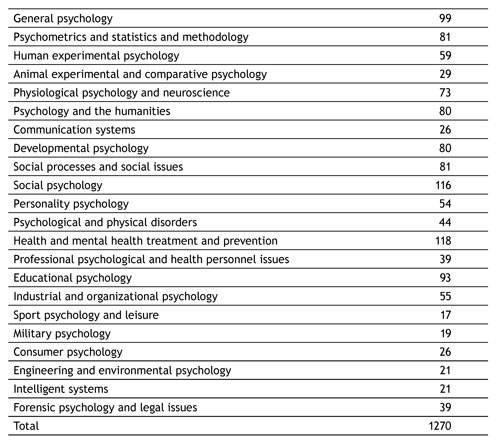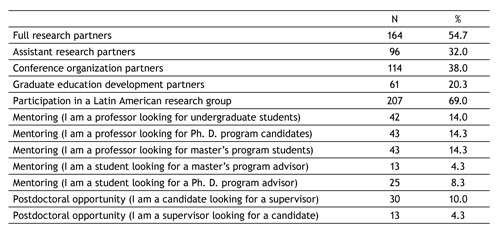International cooperation is increasing in many scientific fields (Bozeman & Corley, 2004; Kliegl & Bates, 2011; Leydesdorff & Wagner, 2009; Wagner, 2006; Gama & Velho, 2005). According to Katz and Martin (1997), co-authorship is the basic unity to evaluate cooperation. This intensification is also observed in Latin American science (García, Acevedo-Triana & López-López, 2014). Fernández, Gómez and Sebastián (1998) observed that 31.7 % of all scientific publications between 1991 and 1995 were coauthored; however, partnerships with other Latin American countries were less frequent than partnerships with European countries and the USA. In Brasil, Vanz (2009) found that 30.3% of the scientific papers published between 2004 and 2006 were based on international cooperation and the main scientific partners were the USA, France, Great Britain and Germany. This pattern of cooperation may be related to the need for better visibility, research quality or impact factors, what becomes highly attractive for researchers within institutions, universities or laboratories and may contribute to improve their rating processes of international recognition (Alzate-Medina, 2008; López-López, Moya-Anegón, Acevedo-Triana, García & Silva, 2015).
Concerning Psychology, Kliegl & Bates (2011) found a significant growth in the rate of international coauthored papers in an investigation of twelve main psychological journals between 1975 and 2007, which indicates the internationalization of psychological research since the 1970, but with an escalation starting in the 1990 (for a recent production analysis see García-Martínez, Guerrero-Bote & Moya-Anegón, 2012). Considering the Iberoamerican production in Psychology between 2005 and 2007, López-López, García-Cepero, Aguilar-Bustamante, Silva & Aguado (2010) draw attention to the low level of international cooperation, indicating that 92 % of the papers were not based on international cooperation, and stressing the urgency to advance both national and international cooperation. According to these authors, it is difficult to establish and keep national and international cooperation networks in Latin America. López, Silva, García-Cepero, Aguilar-Bustamante & López (2011) analyzed Latin American journals included in the Redalyc data base between 2005 and 2007 and also indicates the lack of cooperation in Latin American Psychology. They affirm that national and international cooperation for investigations and joint publications in Latin American Psychology are still embryonic, reiterating the need to create and enhance cooperation networks in the continent. The demand to an integrated Latin American Psychology has been defended by authors such as Koller, Sarriera & Silva (2008). In a more recent review, which focused more on the investigation field, authors found that the distribution of cooperation could be mediated by individual practice in each specific area, and as a result humanities has lower cooperation rates in Latin America compared to other regions (Salazar-Acosta, Lucio-Arias, López-López & Aguado-López, 2013). This process differs from interests and range of investigations in countries outside Latin America (García-Cepero, 2010).
García, Oliveira & Nunes (2013) investigated personal networks and institutional participation for scientific cooperation in the Latin American behavioral sciences. They found different forms and processes of international scientific cooperation in the continent. These authors highlight that cooperation was usually related to some kind of scientific relationship, and more than half of the authors who had a joint publication had already worked together as tutor and graduate student or both had been colleagues in graduate courses. The opportunity to work together in the same institution was also important during the cooperation period among researchers and 55 % of them had visited the partner's institution during the investigation for a month or longer. The most important partners in these cooperation efforts were colleagues who worked at the same institution or other at Latin American organizations. The most important institutions found in this investigation were graduate courses and scientific associations.
García, Acevedo-Triana & López-López (2014) have also investigated scientific cooperation in Latin American behavioral sciences based on Psycinfo data from 2001 to 2010. They identified 528 publications in which coauthors were from at least two Latin American countries. Those with the highest participation rate were Brasil, Mexico, Argentina, Colombia, Chile and Peru. In order to be considered in the sample, publications had to be exclusively Latin American or could have had co-authorship of researchers of one or more countries from other continents. Based on this documental investigation, the areas that showed the largest number of joint publications were Psychological Disorders and Physical Health, Mental Health Treatment and Prevention, and Physiological Psychology and Neuroscience (García et al., 2014). The authors discuss possible ways to expand cooperation in Latin American Psychology.
International scientific cooperation has been depicted as a communication network (Wagner, 2006) under the influence of sociocultural factors, including economic, cultural, and organizational aspects (Hwang, 2008). Wagner (2006) points out the emergence of regional hubs of scientific cooperation. Other authors have discussed the limitations and relevance of Latin American scientific networks, though. Sartori & Pacheco (2006), for instance, mention that Latin America displays an incipient and heterogeneous scenario of research networks despite the presence of more than 700 universities and research institutes in the region. Moreover, most Latin American universities do not elaborate institutional strategies for international cooperation (Sebastián, 2003). The importance of organizing and disseminating scientific knowledge generated in developing countries, especially in Psychology, is discussed by Sampaio (2009). These findings do not follow some recommendations in terms of visibility so that an increase in the number of researches and institutions coauthoring projects increase the likelihood of being cited and create a higher chance of keeping cooperation networks (López-López et al., 2015).
Literature on cooperation in Latin American Psychology is limited at the moment. Some studies have indicated that cooperation is still little (Chinchilla-Rodríguez, Vargas-Quesada, Hassan-Montero, González-Molina & Moya-Anegón, 2009; López-López et al., 2015). However, the importance of research cooperation has already been stressed by different authors, as well as its advantages to those who cooperate, such as visibility and number of citations, as well as a mechanism to neutralize potential methodological errors, biases in analyses or openly fraudulent behaviors (Acevedo-Triana, López-López, & Cárdenas, 2014). This paper aims at investigating research interests of 300 investigators belonging to a scientific Latin American Psychology network.
Method
Data already available at the International Scientific Psychology Network was used for this documental investigation. A group of 300 members was considered as the sample in order to obtain information, which was later subject to content analysis. Information obtained from members' public profiles included the country where the researcher currently lived, so that it could be possible to identify international participation. Members were from different countries in Latin America as well as from other continents. The second aspect investigated was the member highest degree and current position at the affiliated institution. These were also available at the public profiles, which made possible the participation of different professionals with different educational levels in the online network. Such data are also presented descriptively below and includes different categories. Members also indicated general research interests in their profiles, choosing one or more options out of 22 available fields. Data are presented quantitatively reflecting all the choices made by members. Research interests could be described in description box when filling the profile by members and these data were subjected to thematic content analysis. First, topics indicated by members were separated and then were compared so to organize thematic groups based on similarity. Members indicated specific research interests in different levels. Topics were quite diverse and were used as criteria to find subgroups, which were considered when at least five researchers used the same topic based on similar descriptive terms. When filling the box to provide information about cooperation modality, network members had also to indicate one or more options explaining how they intended to cooperate with fellow researchers. There were twelve alternatives and members could specify as many options as they wanted. Data concerning cooperation modality are presented descriptively below as well.
Results
1. The Network: mission, actions and types of members
The International Scientific Psychology Network intention is to promote advances in Psychology in Spanish- and Portuguese-speaking countries through international scientific cooperation among Spanish- and Portuguese-speaking researchers as well as making it possible to connect them with scholars all over the world. The following basic actions are proposed to promote international scientific cooperation: (a) identify researchers and themes investigated by Spanish-and Portuguese-speaking Psychology researchers, (b) publicize research production and interests to foster the visibility of Spanish- and Portuguese-speaking scientific Psychology. Two types of members compose the network: (1) spanish and portuguese speaking members from any spanish and portuguese speaking country who are actively engaged in research in Psychology, including faculty members, graduate and undergraduate students; and, (2) international members from any country and language orientation who are interested in psychological research conducted in spanish and portuguese speaking countries.
2. Countries
The 300 participants belonged to 23 countries in different continents. Most participants were from Latin America (262), whereas participants from other continents were limited to 38. Data are shown in tables 1 and 2 below.
As indicated in table 1, members were from twelve Latin American countries, mainly Colombia, Brasil, Argentina, Mexico, Chile and Peru. As shown in table 2, external members were from eleven countries from other continents, mainly Spain, USA, and Portugal.
3. Participants: Highest degree and current position
The objective of the network is joining researchers as well as graduate and undergraduate students interested in research cooperation in Psychology. Members had to indicate their educational level, what is considered important to encourage different forms of cooperation. Their educational level is described in table 3.
As seen in table 3, members have different educational levels, varying from undergraduate students, graduate students, registered psychologists, specialists, masters and those with doctoral degrees. The first aspect we would like to emphasize is the high percentage of members with a master's or doctoral degree (n = 199), what corresponds to almost two thirds of our sample. Data indicate that most participants have previous experience in research, obtained at least during graduate courses. The participation of students (both undergraduate and graduate) and registered professionals or specialists also indicates that cooperation is sought by different segments and that this could result in different kinds of cooperation among network members. Table 4 indicates participants' occupation, except those who signed their profiles as undergraduate or graduate students.
These data indicate that most members are already a college professor and/or a researcher. Those who are not in universities or research centers are professionals working as registered psychologists or in other positions. As mentioned in table 4, data reveals that most members are working at universities, indicating that research is closely related to tertiary education institutions and potential participation of graduate and undergraduate students in research activities. Few participants with a doctoral or master's degree did not inform being affiliated to a university.
4. General research interests
In order to generate cooperation among members of the network, they are asked to describe their general research interest when filling their profile. Members could choose from a list with 22 options used by the American Psychological Association (APA) to describe different areas or publications in Psychology to specify their interest. Members could indicate as many terms as they wanted. Analysis showed that all 300 members indicated a total of 1270 terms within the 22 areas considered (see table 5 below), what means that each one indicated about four items in average.
The general research interests have been divided into four groups, according to the number of citations members made in their profiles. In the first group (between 91 and 120 indications), the areas were Health and mental health treatment and prevention (118), social psychology (116), general psychology (99), and educational psychology (93). In the second group (between 61 and 90 indications), the topics are: Psychometrics and statistics and methodology (81), social processes and social issues (81), psychology and the humanities (80), developmental psychology (80), physiological psychology and neuroscience (73). In the third group (between 31 and 60 indications), we have the following areas: Human experimental psychology (59), industrial and organizational psychology (55), personality psychology (54), psychological and physical disorders (44), professional psychological and health personnel issues (39), forensic psychology and legal issues (39). In the fourth group (below 30 indications), we have seven areas: animal experimental and comparative psychology (29), communication systems (26), consumer psychology (26), engineering and environmental psychology (21), intelligent systems (21), military psychology (19), and sport psychology and leisure (17). These data indicate that the network members have research interests related to all areas considered by the APA.
5. Modality of cooperation
Network members had different options to best describe the kind of cooperation they were looking for. There were items related strictly to research cooperation (full research partners and assistant research partners), and other items related to conference organization (conference organization partners), graduate education (graduate education development partners), networking (participation in a Latin American Research Group). Moreover, seven items related to mentoring, including potential candidates and supervisors (I am a professor looking for undergraduate students; I am a professor looking for Ph. D. program candidates; I am a professor looking for master's program students; I am a student looking for a master's program advisor; I am a student looking for a Ph. D. program advisor) could be used to describe the kind of cooperation intended. Members looking for postdoctoral opportunities have also been considered for analysis (I am a candidate looking for a supervisor and I am a supervisor looking for a candidate). Data on the modality of cooperation sought is available in table 6 below.
"Participation in a Latin American Research Group" (n = 207, 69.0 %) obtained the highest score. Members looking for full research partners (n = 164, 54.7 %) were the second most frequent modality. The importance attributed to "Conference Organization Partners' (n = 114, 38.0 %) was also considered high in profiles analyzed. A total of 61 members (20.3 %) were looking for 'Graduate Education Development Partners". "Mentoring" is another group of scientific activities highly considered by members. Several possibilities of mentoring descriptions are available for both professors and students. In sum, all alternatives were indicated by members, what suggests that all levels of cooperation should be considered.
Discussion
The most important countries in cooperation efforts through this network were Colombia, Brasil, Argentina, Mexico, Chile and Peru, respectively. Similar results were found by García, Acevedo-Triana, & López-López (2014). Considering countries from other continents, Garcia, Acevedo-Triana, & López-López (2014) observed that the most important countries cooperating with at least two Latin American countries were the USA, Spain and the United Kingdom. In the present investigation, data also suggested Spain and the USA as the two most important countries, and Portugal was the third most representative one, though. Nevertheless, data suggests that the same trends to cooperate inside the American continent or inside Iberoamerica were present (López-López et al., 2015).
Data on educational level indicated that most researchers held a Ph. D. or a master's degree (199), but also included those pursuing such degrees (36), certified specialists, registered psychologists and undergraduate students. García, Oliveira & Nunes (2013) had pointed that most authors who had published a paper in co-authorship had some kind of previous relationship with his/her scientific partner, such as supervisor-graduate student. Thus, the investigated network seems to feature some similar patterns observed in coauthored cooperative papers. This data also indicates the importance of graduate courses for cooperative efforts. Bearing in mind general research interests in profiles, all areas considered by the APA were indicated at least 17 times (e.g. Sport Psychology and Leisure).
Data obtained in this investigation is quite different to those obtained by Garcia et al. (2014) concerning the distribution of general research interests. Some differences could be explained by the inclusion of areas such as Neurosciences, Nursing, and Psychiatry in the Psycinfo database, and, therefore, a greater number of papers related to psychological and physical disorders, and health and mental health treatment and prevention. general psychology, social psychology and psychology and the humanities are the areas with more interest declared among the network members. Data also revealed that there is an interest to cooperate in different areas and that coauthored papers from different investigation areas could be expected in the future as a result of interaction among members.
Although specific research interests are more diverse, they would more likely generate cooperation. Hence, some subareas or specific topics cited five times or more are possibly those from which some kind of cooperation could rise, as it is the case of history of psychology, neuropsychology, gender studies, positive psychology, cultural and cross cultural psychology, cognition and learning, community psychology, drug addiction, and so forth.
Considering the modality of cooperation, participation in a Latin American Research Group (n = 207, 69.0 %) obtained the highest score. We evaluate the interest in participating in Latin American research groups as a networking phenomenon and also as the need to more collective cooperation efforts in Psychology. Even though the participation in research groups was informed by 207 members, groups formed in the network are few yet. We suppose that a next stage in the development of cooperative research in Latin America (or involving Latin American researchers) should be the development of thematic groups within the network.
Most members were seeking full research partners (n = 164, 54.7 %). In this sample, it is clear that traditional research activities are essential. Another possibility chosen was searching for assistant research partners (n = 96, 32.0%). We considered that the objective is fundamentally scientific in both cases. It is interesting to note that searching full research partners is more frequent than trying to find assistant research partners, though. We could suppose that the network members are more interested in egalitarian cooperation, in which both investigators share similar roles than in a more asymmetrical collaborative effort in which an assistant would possibly contribute to the main researcher's project.
Surprisingly, conference organization partners are attributed great importance (n = 114, 38.0 %). Conferences are more related to the product of investigations rather than previous categories, which were more related to the process of scientific production. Nonetheless, it indicates that cooperation is not restricted to the research process, since other activities related to science are also mentioned by a number of participants.
Another activity related to scientific investigation is graduate education. A total of 61 members (20.3 %) were looking for Graduate Education Development Partners. This is another indicator that those looking for cooperation in scientific activities may also be interested in cooperation in related areas such as graduate education. If we consider conference organization as a posterior stage of scientific activity, we could consider graduate education as a prerequisite for researches and even the participation of a fair number of investigators.
Mentoring is another aspect of scientific activity and several possibilities of mentoring have been studied, from both professors' and students' perspectives. In three cases, mentoring was considered from the standpoint of mentors. In this case, they were mentors looking for undergraduate students (n = 42, 14.0 %), for Ph. D. program candidates (n = 43, 14.3 %) and Master's Program students (n = 43, 14.3 %). Numbers were quite similar, indicating that all three levels are considered important for research activity. There was a smaller number of students looking for advisors in two levels: Master's Program Advisor (n = 13; 4.3 %) and Ph. D. program advisor (n = 25, 8.3 %). This possibly is related to limited number of students in the network. Considering postdoctoral opportunities, it was more usual to find candidates looking for supervisors (n = 30, 10.0 %) than the opposite, i.e. supervisors looking for candidates (n = 13, 4.3 %). Both cases occurred, indicating that this should be considered in efforts to develop cooperative research in Latin American Psychology. In sum, all mentoring alternatives were indicated, what suggests that all levels of cooperation may be considered by members.
Conclusion
Although cooperation in Latin American Psychology has been considered little by several authors, the analysis of this Latin American research network indicates a real potential to develop collaborative research in the continent. Data also indicated that there is a wide interest in all research areas, what suggests the emergence of more diversified cooperative investigation in future.













